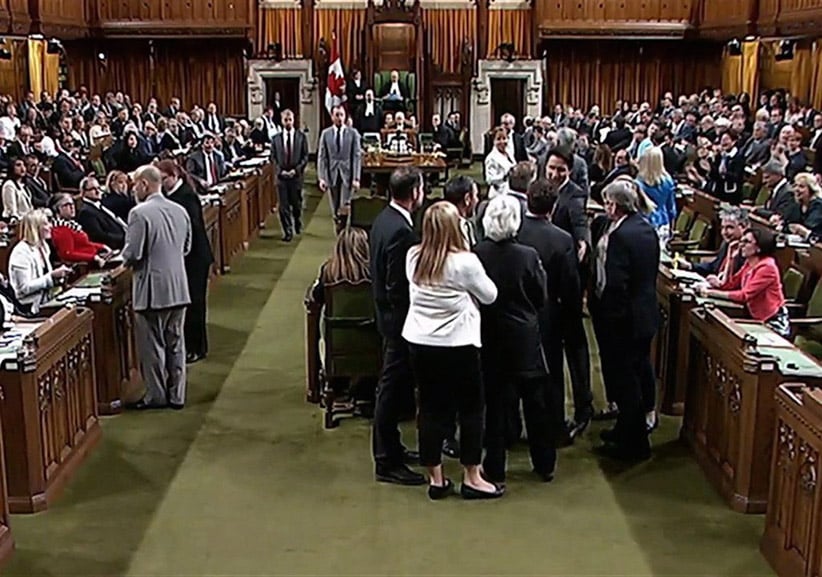Maclean’s Explains: Bells, whips, vote calls and time constraints
Some answers to questions you may have about the House rules and procedures at play in the elbowing incident
Share

Many questions have been asked since Prime Minister Justin Trudeau burst across the floor of the House on Wednesday in an attempt to stop the NDP from delaying a vote. What on earth was he thinking? We have no idea. However, we do have some answers to questions you may have about House rules and procedures:
Why were MPs on their feet in the first place?
Before votes take place there tends to be a 30-minute vote call during which bells sound in the Parliamentary Precinct. During those bells, MPs in the chamber tend to mill about and chat. It is one of the few times MPs are all in the same place, so it offers opportunity to talk about important issues, or to buttonhole a minister. Generally the milling stops when the Speaker calls the chamber to order.
What was the issue with the whips?
The House of Commons Procedure and Practice, commonly known as O’Brien and Bosc, says the following:
When they conclude that their respective Members are ready to vote, the Whips of the government and of the Official Opposition make a ceremonial return to the House, and the ringing of the bells ceases. The Whips enter the Chamber together, proceed up the aisle toward the Chair, bow to the Speaker and to each other and resume their seats. This convention provides a signal to the Speaker that the House is ready to proceed with the vote. Once the Whips have taken their seats, the Speaker calls the House to order and immediately puts the question.
On Wednesday night, as government whip Andrew Leslie was making his way down the aisle, several NDP MPs decided to block Opposition whip Gord Brown from his path in an attempt to delay the vote as a protest. It was at this point that the PM appeared to lose his temper and marched over to break Brown out from behind the blockade.
Did the Opposition whip need to be at his seat before the vote could start?
Not according to Speaker Geoff Regan. As he said after the incident, “Members ought to know, first of all, that if one whip walks down before the other and takes his or her seat, and that is either whip, the Speaker then reads the question and the voting process begins. Nothing else is required. That is what happens. That has happened before.”
It’s possible Trudeau did not know this was the case. Reviewing the video, it seems Leslie may also have been unsure what to do with Brown still stuck at the entrance. Leslie stood at his desk, apparently unsure of whether or not to sit so the question could be read.
MORE: Nick Taylor-Vaisey on the elbow that nearly ruined Parliament
What were the time pressures around this vote?
The government was attempting to invoke time allocation, which is a way of scheduling debate times rather than allowing debate to collapse on its own. (Note that while the opposition calls this “closure,” actual closure is a very different procedural tactic.) The plan was to ensure there could be a vote on report stage of Bill C-14, the medical assistance in dying bill, and a third reading vote by Friday so the bill could head to the Senate in time for them to pass it before the Supreme Court’s June 6 deadline. After the Elbowing and the ensuing multiple invocations of parliamentary privilege, report stage debate on C-14 never did take place either Wednesday night or at any point Thursday. As a result, the timetable for getting the bill to the Senate is now blown. The House does not sit next week, so it looks like Parliament will not meet the June 6 deadline.
As for Trudeau, he may have been impatient because he was overdue to meet B.C. Premier Christy Clark and knew she was waiting in his office. After that meeting, he was scheduled to speak to Sikhs who had come to Parliament Hill for the Komagata Maru apology. He was late for both engagements thanks to the Elbowing and the subsequent apologies.
MORE: Paul Wells on how the Liberals brought this elbowing on themselves
What about Ruth Ellen Brosseau? Were her privileges violated?
After being elbowed, Brosseau left the chamber to collect herself. She ended up missing the vote, thus claiming her privileges as an MP had been violated. The Speaker agreed that there appeared to be a prima facie case of a breach of her privileges. The Commons agreed to send the matter of Brosseau’s “physical molestation” to the Procedure and House Affairs committee.